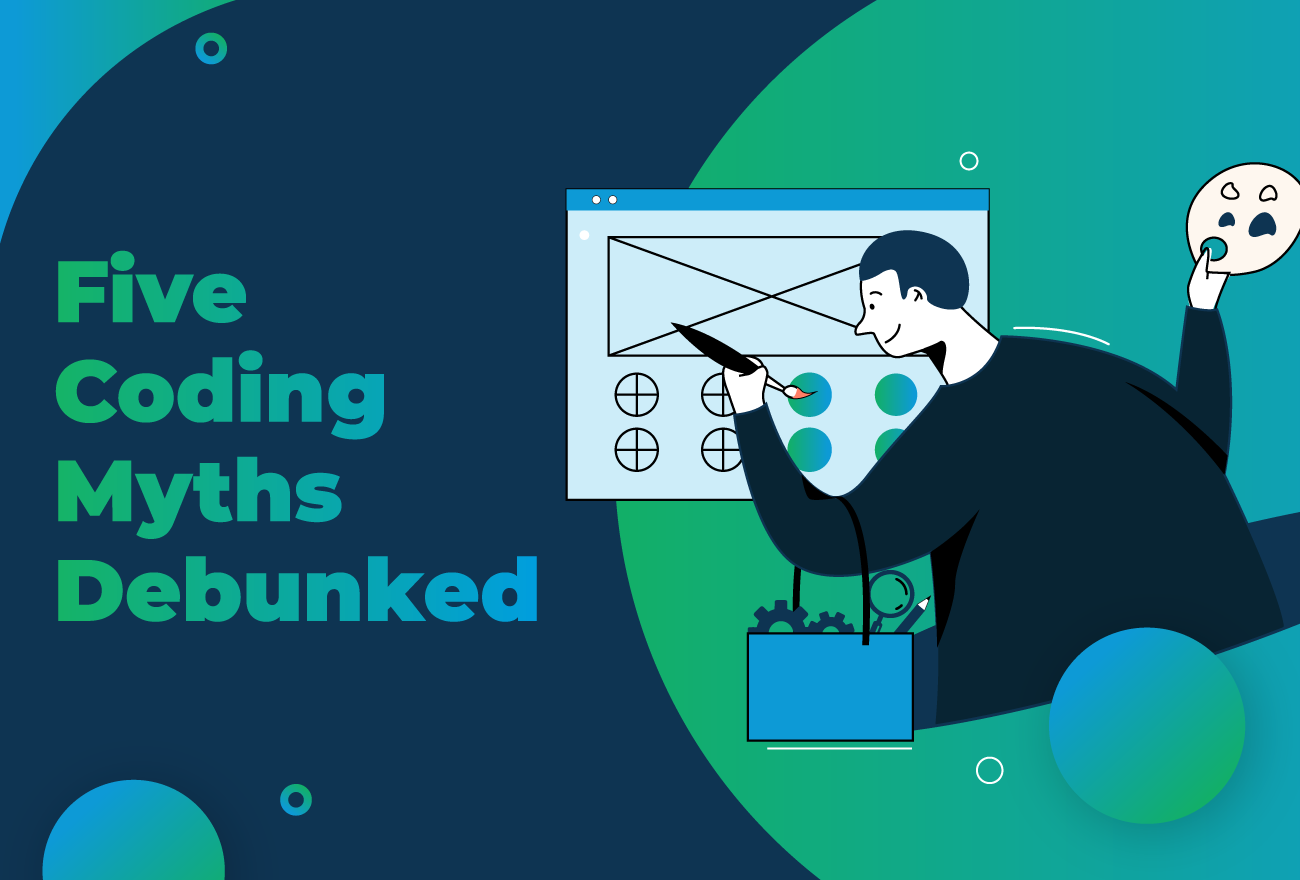If you’re dreaming of becoming a software developer, you’ve probably encountered some hurdles along the way. Whether it’s people who tell you that learning Python takes several years, or it’s personal insecurity, overcoming the blocks in your path to success requires learning, as well as unlearning.
To help you unlearn some of the beliefs that may be holding you back from achieving your dream, we’ve listed and debunked five of the most common coding myths in software development.
Myth 1: You need to be a child genius to excel at programming
Often, people will say that the best programmers naturally excel at maths and start coding from a young age. This belief is incredibly discouraging for adults with no coding knowledge who are interested in becoming programmers. And, to be frank, it simply isn’t true.
Coding is the culmination of logic and writing. It involves writing instructions for a computer to follow. Therefore, problem-solving skills are far more critical than maths when it comes to coding. If you passed maths at a high school level and are willing to learn, you have enough logical skills to become an expert coder.
More than half of our students have only a higher diploma or high school education, yet a whopping 84% of our graduates achieved their intended goals within six months of completing a bootcamp.
As for age, the Africa Developer Ecosystem Report for 2021, the global average age of developers is 36. It’s never too late to start. HyperionDev equips adults with no prior coding knowledge with all the skills they need to become developers. This goes to show how possible it is for adults without prior experience in tech to make a career change toward software development.
Myth 2: Only people with university degrees in software development become programmers
Traditionally, university degrees were career-specific and required for most jobs. Times have changed, and having proof of skills is far more critical nowadays. There are several avenues to choose from as you develop new skills—and while a university degree remains one such method, it is no longer the only way.
One tried and tested path to successfully upskilling in code is completing an online software development bootcamp. HyperionDev’s graduates are a testament to this. Our students have gone on to become junior developers within weeks of graduating, and some even get employment while completing their courses. This proves that recruiters and companies are looking for skills and a solid portfolio rather than a certain degree.
Myth 3: It takes 10,000 hours to become skilled at programming
The popularisation of the so-called “10,000 hours” rule from Outliers by Malcolm Gladwell has caused people in various industries to believe that they need exactly that to be proficient in a skill.
While there is merit to Gladwell’s claims, the Stack Overflow’s 2021 Developer Survey results show that 35% of participants have only been coding professionally for 4 years or less. The results also showed that over 40% of participants learnt how to code online, and you can too.
In 3 to 6 months, depending on if you decide to enrol as a full-time or part-time student, HyperionDev’s highly practical bootcamps will equip you with the coding skills necessary to confidently walk into your first software development job and succeed in your career.
Myth 4: Learning to code is expensive
This one is founded on the second myth in this series. Because of the belief that a degree in Computer Science or Software Development is needed to become a developer, there is a belief that learning to code is expensive. Yes, traditional university degrees are pricey, but they’re not the only option to achieve the intended outcome. Coding bootcamps are affordable, and many providers offer payment plans to suit every budget.
HyperionDev offers upfront payments at a discount or monthly payments. We also offer scholarships and have partnered with financial institutions to finance up to 100% of the cost of a bootcamp.
Myth 5: Tech jobs are boring because you have to sit in front of a computer all day
This is a common myth perpetuated by movies: the computer geek sitting behind his screen tapping away on a screen with old pizza boxes strewn around his desk.
Don’t be fooled. The 50 Best Jobs in America 2022 report, published by Glassdoor, found that the top 12 jobs are in tech. Full Stack Engineer came in at number 2, Data Scientist at number 3, and Software Engineer holds 8th place. The report looked at salary, job demand, and job satisfaction factors.
Many of the jobs in tech involve training, marketing, dealing with people, or organisational skills. For example, an Analytics Manager uses an understanding of the industry, customers, and tech knowledge to make multiple business decisions such as which products to sell to which customers. And a front-end engineer uses code but also deals with a wide variety of people, from customers to content writers.
Tech work is as varied as you want it to be. Every company uses tech and needs tech-savvy people in their workplace.
Hopefully, we’ve cleared up any coding myths that have been blocking you from pursuing a career in software development. If you’re ready to embark on your journey to a lucrative career in the tech industry, find out more about HyperionDev’s coding bootcamps here.
Editors note: this article was originally published in June 2018.


